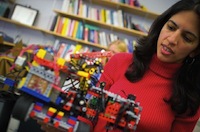
Robohub.org
098
Self-organizing systems with Radhika Nagpal
In today’s episode we focus on self-organizing systems in modular and swarm robotics with Radhika Nagpal, director of the Self-Organizing Systems Research Group at the Wyss Institute for Biologically Inspired Engineering at Harvard.
Radhika Nagpal
 Whether you’re looking at multicellular organisms or social insects such as ants and termites, nature has found powerful ways to make systems self-organize. In these collectives, individuals that are typically simple, unreliable, and limited, cooperate through local interactions to achieve complex behaviors.
Whether you’re looking at multicellular organisms or social insects such as ants and termites, nature has found powerful ways to make systems self-organize. In these collectives, individuals that are typically simple, unreliable, and limited, cooperate through local interactions to achieve complex behaviors.
Radhika Nagpal has been building on these principles to make modular and swarm robots that are able to work together in a decentralized manner. She tells us about a self-balancing modular table that is able to adapt to terrain while balancing your cup of coffee. In the TERMES project, robots work together to build the environment in which they evolve, creating the very staircase that will allow them to build a structure. We also look at how her group has made large-scale swarm robotics a reality with the kilobot project and its 1024 quarter-sized robots previously featured on our podcast.
Finally, Nagpal tells us about how her insights in mathematics and the theory of self-organization can also help us learn something about biological systems.
Links:
- Download mp3 (25.8 MB)
- Subscribe to Robots using iTunes
- Subscribe to Robots using RSS
- Radhika Nagpal’s Homepage
tags: bio-inspired, modular, podcast, Swarming





